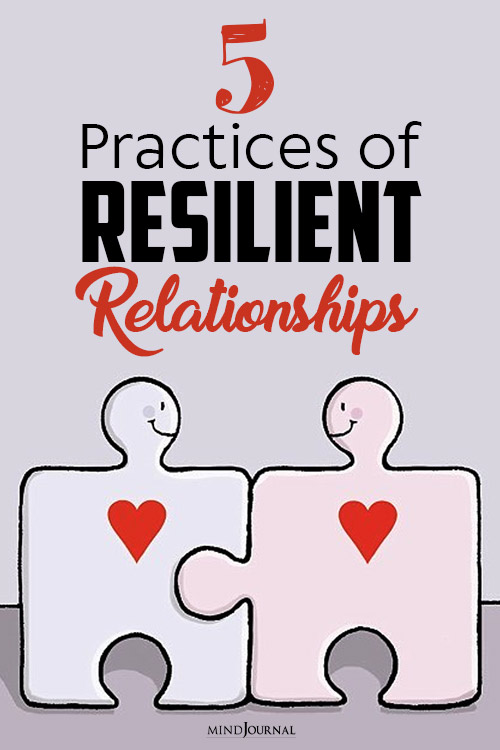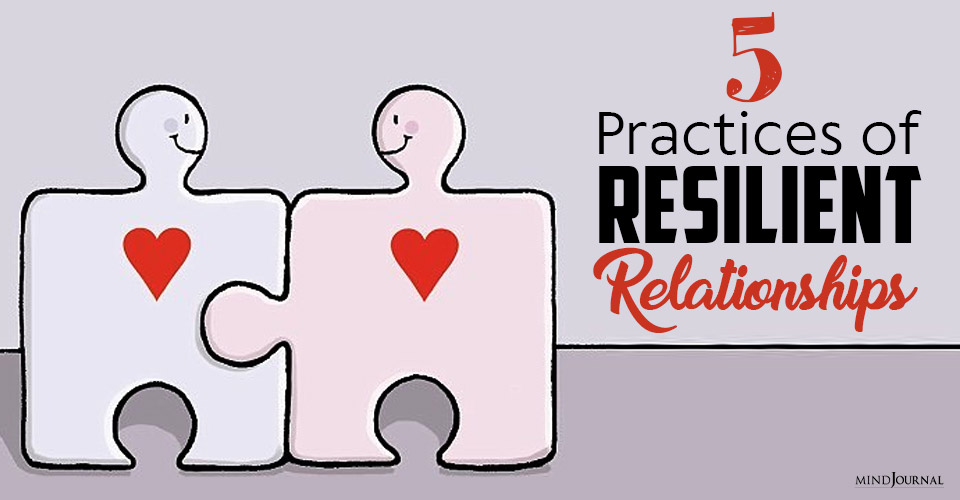“It is your reaction to adversity, not the adversity itself, that determines how your life’s story will develop.” – Dieter F. Uchtdorf
Key Points:
- Resilient relationships are able to handle the weight of conflict. They are stretchy like a rubber band, not fragile like eggshells.
- Practices of resilient relationships include showing up, seeing and being seen, sharing power, disagreeing well, and taking breaks.
- Healthy disagreement is especially important for relationships to be strong.
It’s easy to feel confident and secure in a relationship that rarely experiences conflict. Resilience, however, is forged in difficult times.
What is a “resilient relationship?” As a conflict and communication specialist, I define it as “relationships that can hold the weight of conflict and not break.”
In other words, resilient relationships are secure enough to grapple with the hard stuff. Instead of walking on eggshells, resilient relationships are stretchy like a rubber band. Rather than crumbling under tension, they are able to stretch, then spring back together.
Related: 6 Signs Your Partner Has Difficulty In Resolving Conflicts in the Relationship
Times Are Tough Right Now
In our current landscape of deep social and political polarization, many of us find that our bonds with our friends, family, co-workers, and neighbors have been strained by differences of belief around things like politics and religion. Over time, without intentionality and the right skills, these bonds can erode or break entirely.
A quick disclaimer: This article presumes you are pursuing a stronger relationship with someone who is relatively safe to be in a relationship with, someone who has your interests at heart. If that’s not the case, or if you’re unsure about your safety, please consult a helping professional.
5 Practices Of Resilient Relationships
People who build resilient relationships know that these relationships don’t happen by accident, and they don’t happen overnight. Resilient relationships may look different across the board, but they all have commonalities at their core. While we can pursue many positive ways of treating each other that keep relationships healthy, there are five distinct practices that help us create bonds that can withstand the strain of conflict:
- Showing up for each other
- Seeing and being seen
- Sharing power
- Disagreeing well
- Taking a break
If some or all of these practices are absent, the relationship will fracture or fade over time. All five are needed to build longevity. These practices don’t have to be practiced perfectly, but they do need to be practiced in order for resilience to exist.
1. Showing up for each other
In our media bubble, algorithm-driven digital world, it’s quite easy to surround ourselves with only people we agree with (and demonize everyone else). But if we want strong communities, families, and friend groups, we need to exchange and interact and brush shoulders with people from different walks of life.
It might sound straightforward, but we can’t have resilient relationships—or relationships at all—if we don’t make time for each other. Showing up means being intentional about these interactions.
2. Seeing and being seen
Seeing someone means making an honest, open, curiosity-driven inquiry into the center of who they are and what makes them tick. Seeing means pausing judgment and trying to first explore the ideas, values, and beliefs that our conversation partners hold—trying to understand how those things connect for them, even if we don’t agree.
It is possible to see someone without letting go of the strength of our convictions or opinions, without abandoning our boundaries. When we choose to see others, we are inviting them into a stronger relationship by honoring their humanity.
Being seen is the other side of the coin. As we do the work of seeing someone, we in turn invite them to see us. Being seen means letting someone into our world and letting them see what makes us tick. This means passionately and ethically articulating our stance while remaining open to the fact that our conversation partner may still disagree with us.
Being seen is an act of vulnerability and trust; it means letting someone pick up our opinions and test them, letting someone get to know us in the truth of who we are and what we have experienced.
Related: How Resilient is Your Love During Relationship Conflicts- 10 Questions To Ask
3. Sharing power
Sharing power means practicing equality and refraining from domination or control. In sharing power, we make space for each other. When everyone has space, when everyone has a voice, we build a solid foundation of resilience when conflict arises. When someone feels they don’t have a voice or that power has been taken from them, it’s like adding gasoline to a fire.
Especially when we believe we are right, it can be hard to think about the consequences of the ways we use power. Saying true things without care for the person or concern for the relationship is not the true spirit of sharing power. In failing to share power, we risk our credibility and trust. Sharing power means inspiring, not controlling; persuading, not punishing.
Sharing power is extremely hard, especially for those of us who have been granted a lot of privilege and have been taught that we should automatically have more power than others. But resilient relationships can only happen if everyone has an equal seat at the table.
4. Disagreeing well
Relationships are resilient when they can hold the weight of conflict and impasse. Instead of running away from disagreement, we must learn the art of healthy disagreement.
What is “disagreeing well?” It means—after showing up, seeing and being seen, and after sharing power—that we engage each other on tough issues in ways that make us stronger, together.
Disagreeing well means:
Suspending the desire to resolve.
It’s quite understandable to want the people we care about to agree with us. But if we want resilient relationships, we need to focus on the stability and long-term health of the relationship before forcing agreement or resolution.
Related: 4 Ways To Strengthen A Resilient Mindset Amidst Adversity
Asking great questions.
People who forge resilient relationships understand the value of asking great questions. Work like archeologists, carefully digging up meaning and nuance, handling anything they find with great care. This ensures they are understanding the complexity of someone’s view, so that when they disagree they can speak accurately and with care.
Banishing shame.
When we let ourselves make mistakes and change our minds without shame, we further reduce anxiety and animosity. No one likes to operate in a gotcha! environment. Except for extreme circumstances, consider that it’s much more effective to leave shame at the door. Focus on calling in (educating), not calling out (shaming or embarrassing).

Inviting others to sharpen us.
A great conversation partner can disagree with us on just about anything under the sun, but they will challenge us and sharpen us in positive ways. When we seek to challenge those around us, and when we allow others to challenge us, we open the door to seeing, learning, and teaching things that we would otherwise miss out on.
Telling the truth.
Resilient relationships give us the confidence to tell the truth because we know the relationship is sturdy enough to handle honesty. Truth-telling is one of the highest and important values of true friendship, and it’s important when we are disagreeing with someone that we co-create an environment where everyone can say what they really think and feel.
Saying “thank you.”
When someone takes the time to disagree with us in healthy ways, they are giving us a gift. They could have called us names, or walked away, but here they are: sticking it out with us, even if the conversation is hard or uncomfortable. Express gratitude for those who disagree with us in healthy ways, because healthy disagreement is a mark of resilience.
Disagreeing well is one of the most important skills we can learn in the pursuit of resilient relationships. While it may not be realistic to expect everyone to always agree, it is realistic to protect our relationships when we disagree.
Related: 7 “Love-Saving” Words You Can Use For Handling Conflict
5. Taking a break
Dealing with conflict and impasse requires a lot of resources. We expend time, energy, emotions, and resources to navigate tough situations. This work can be exhausting, especially if it is prolonged.
If we go too long without taking a break, it might start to seem like we spend all our time talking about the relationship instead of having one. Sometimes it might seem like the only thing that keeps us in community is our disagreement. So how do we replenish our reserves and care for ourselves—after we’ve been driving each other up the wall?
Just like a rubber band snaps back after being stretched, resilient relationships must also bounce back. At a point, we need to take a break from conflict—at the very least, we need to take a break from talking about the conflict. The relationship just needs to be a relationship.
This is how we make the memories together that forge our identities, how we remind ourselves who we are. Creating memories reminds us of the positive things we stand for, even across differences.
In Conclusion
No one is obligated to try to build a resilient relationship. We can stay in our bubbles and refuse to speak to anyone who disagrees with us. We are even allowed to cut people off we don’t like.
But consider that something is lost in this polarization. Community matters, and our personal health and the health of our society are dependent on the strength of these bonds. When we work together to practice the art of resilient relationships—to show up for each other, see and be seen, share power, disagree well, and take breaks—there are few conflicts that can break us.
Related: Feeling Stuck In Useless Relationship Fights? 3 Steps To Get Out
Are you ready to do the work?
Contact Melody at melodystanfordmartin.com. for such informative articles.
Written By Melody Stanford Martin Originally Appeared On Psychology Today









Leave a Reply
You must be logged in to post a comment.